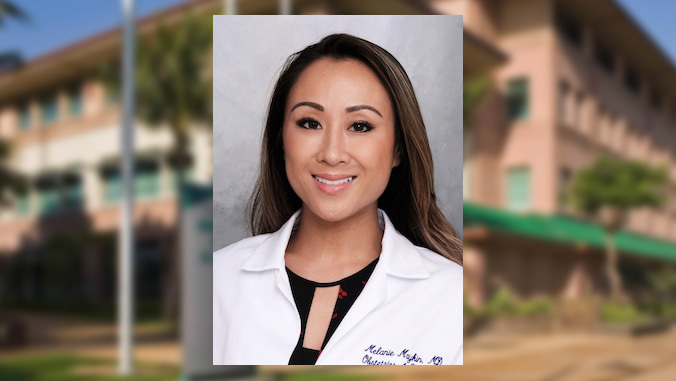
A maternal-fetal medicine fellow at the University of Hawaiʻi at Mānoa John A. Burns School of Medicine (JABSOM) brings focus to discriminatory regulations on postpartum sterilization for Medicaid recipients, particularly women from low-income backgrounds. Melanie Maykin's article was published in a November 10 issue of The Lancet Regional Health—Americas. The manuscript also led to Hawaiʻi Senate Concurrent Resolution 191 (SCR191), Urging the United States Department of Health and Human Services to amend its policies relating to postpartum sterilization waiting periods for Medicaid recipients.
"We're excited to bring awareness to this issue, especially as we reflect on systemic discrimination and inequities within our healthcare system. Still, there is much more work to do," said Maykin, who is with JABSOM's Department of Obstetrics, Gynecology and Women's Health.
Postpartum sterilization, a permanent form of birth control, is a procedure performed prior to a woman's release from the hospital. Under the existing Medicaid insurance regulations, women must complete the mandated Medicaid Title XIX form at least 30 days in advance of the procedure or risk being denied or personally billed for the procedure. This rule does not apply to those who have commercial insurance. However, publicly insured (Medicaid) women who would appreciate the convenience, the economy and the autonomy in planning the size of their family with this procedure, are faced with existing barriers.
State legislation introduced
Maykin's manuscript received the attention of Hawaiʻi State Sen. Chris Lee, who was inspired to write SCR191, which passed committees in the Hawaiʻi House and Senate during the 2021 Legislature. The measure seeks to abolish the time factor that has become obstructive to low-income women and their families.
"This [federal] legislation, which was initially implemented to protect individuals from reproductive coercion, ultimately created barriers to equal access specifically for low-income people," Maykin said. "It's an important reminder that when creating legislation or attempting to repair the harm we've caused with existing policy, we must intentionally center the voices of affected communities."
According to Lee, SCR191 puts the state of Hawaiʻi on record as objecting to the Medicaid requirement. The resolution was also sent to Hawaiʻi's Congressional delegation, and federal department agencies.
"As far as I know, this is the first time a state has come out against this inequitable practice," Lee said. "There are individuals and organizations pushing against this, but Hawaiʻi is the first state."
Supporting testimonies at the Hawaiʻi Legislature were presented by the Hawaiʻi Section of the American College of Obstetricians and Gynecologists, among whom were OB-GYN practitioners, fellows and JABSOM faculty.
Maykin said that providing informed consent 30 days prior to birth, which is already a very unpredictable event, assumes that patients have the privilege of continuity in healthcare to see the same provider or group who knows them well.
"Moreover, this system depends on reliable transmission of the consent form to labor and delivery units. That is just not the reality for many low-income patients," Maykin said.






